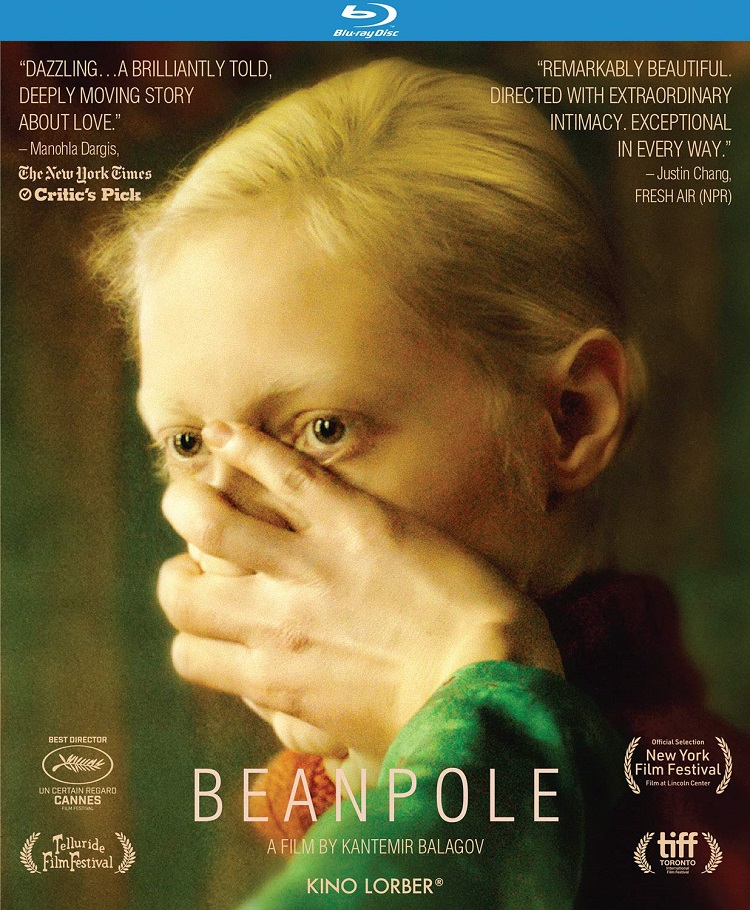
It seems a rare thing these days where a movie about war is able to make an effective statement. War movies naturally tend towards battles full of explosions, gunfire, heroism, and blood. But there are only so many times you can see that before it becomes old hat and boring. Rarer still is the war movie about the emotional damage the battles do to the psyche of individuals and the souls of a nation. What’s left when the fighting ends? Rarer than that is a war movie that concentrates on the women, what they had to endure during the war, and how they cope when it is over. Beanpole, the excellent second film from Russian director Katemir Balagov, covers all of those things and more.
Set in Leningrad – a city that was under siege by the Nazis for some 900 days leading to over one million deaths – just after the war, Beanpole is a film of suffering. Shot in drab greens and greys, the city itself looks hollowed out, destroyed by the war, and not yet ready to renew itself. The people who fill the streets, hospital, and homes in which the movie is shot seemed sucked dry, unable to recover, but trying to find some way to live. They survived the war but seem to ask, “what now?” Or perhaps, “what for?”
The wounded soldiers convalescing inside the hospital in which much of the film takes place play a game with a young boy. They each make the sounds of an animal and try to get the boy to guess its name. Someone barks like a dog and the boy doesn’t get it. Surprised, more men join in until someone realizes he’s probably never seen a dog for “they’ve all been eaten.” Later, the hospital staff has a New Year’s Day party and their “feast” consists but of a few scraps. They are overjoyed to have a little fish. A young man comes to a woman’s house to court her. He brings a gift of a few small fruits. She doesn’t let him in but says he should come back another time with more fruit. And perhaps a little salt. Hunger is a daily occurrence. Starvation is always just around the corner.
The film focuses on two women, Iya (Viktoria Miroshnichenko) the tall, skinny, beanpole of the title, and Masha (Vasilisa Perelygina). They served together on the front lines becoming best friends. Iya was sent home early, suffering from a neurological condition that causes her to freeze in place, unable to move for long periods of time until she suddenly can, awaking as if from a dream. The film uses those episodes to punctuate its themes, sometimes humorously, and often tragic. Masha stayed until the end of the war and when she returns the two of them share a moment. It is a scene in which very little is spoken, but the two say so much with their eyes and faces. Balagov films that moment in one long take, allowing the actresses to come together in joy and sadness. There is a message Iya must share – something tragic which I won’t spoil – and the way it is expressed between the two is the reason I watch movies.
Iya, with her tall, lanky body, pale skin, and enormous eyes, is awkward and shy. She takes on the tragedy of her life with her head down. Masha, beautiful and cunning, has learned how to survive by manipulating those around her. She desperately wants a child, but due to things that happened to her during the war, she is unable to have one. Things the film takes its time letting us in on (it is a film that takes its time letting us in on a lot of things). The way in which she convinces Iya to have a baby for her and the man in which to impregnate her is both cunning and cruel. But this too is tragic. Masha survived the war but lost her soul. She learned to be cruel, to manipulate others to keep herself alive, but that is its own suffering.
Cruelty is the name of the game. Balagov fills this film with cruelty, pain, and suffering. It is a very slow-moving film and deliberately paced. He allows scenes to stretch out in long takes, letting us take in the suffering. There are several scenes in which a lesser director would have cut away, but here the camera lingers, it doesn’t let us off by moving on. But the film never glorifies the horror or manipulates the viewer. There is no maudlin music to tell us how to feel. The actors show their emotions on their faces and behind their eyes, but there is no grandstanding. We get no monologues about how they feel. No shouting or great sobs. It is subtle in this way and more effective for it.
Miroshnichenko and Perelygina, both newcomers to the screen, give brilliant performances. Balagov and cinematographer Kseniya Sereda fill the screen with images that look like paintings, beautiful and textured. Beanpole is an extraordinary movie, one that is difficult to watch and emotionally wrenching, but completely worth it.
This Blu-ray from Kino Lorber looks magnificent. Extras include an interview with the director and several trailers.